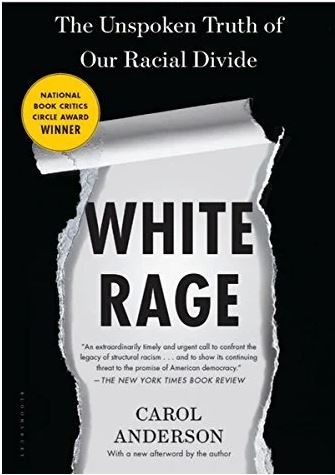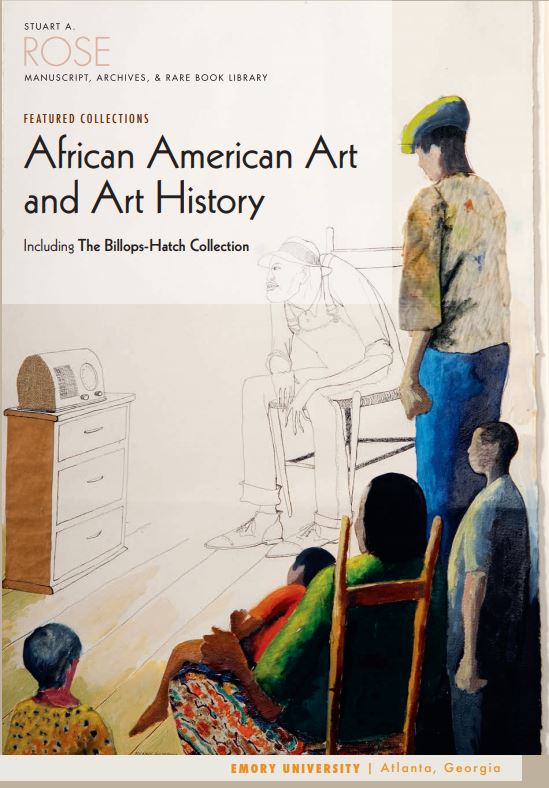This is the fourth and final post in our Racial Justice Blog Series, which brings together Emory Libraries’ resources with the current struggle to foster social change and anti-racism. Over the course of the series, topics have included Black Student Activism at Emory, Protests and Movements, and Voting Rights. We hope the connections that you make between our collections and current events will lead to research, scholarship, engagement, and a new understanding.
Over the past several months, the Racial Justice Blog Series has sought to make connections between our library collections and the social climate of 2020, a year that has been marked not just by the COVID-19 pandemic, but by the murders of African American men and women at the hands of police and vigilantes.
Dean Yolanda Cooper, University Librarian, recognized that Emory Libraries has the “ability to provide significant resources for education and activism [in] historical context.” Cooper commissioned this blog series to “bring together a timely and relevant review of the significant educational resources for study of African American collections in the Rose and Emory Libraries as tied to recent racial unrest.”
In doing so, these blog posts have sought to inform the Emory community about Emory Libraries resources and “our commitment in the realm of documenting the generations of brilliant and impactful African Americans whose lives and works can be studied through their papers and publications in the Rose Library’s collections.”
This blog series highlighted Black Student Activism at Emory, Protests and Movements, and Voting Rights. For our final post, we wanted to recognize another way that activism is manifested by showcasing writers and artists who have maintained the call for social and racial equality.
The social climate of 2020 resulted in many people seeking new knowledge around systemic racism and social justice. Some books of particular interest included: 
- Carol Anderson, “One Person, No Vote” and “White Rage”
- Robin DeAngelo, “White Fragility”
- Ibrim Kendi, “How to Be an Antiracist“
- Isabel Wilkerson, “Caste”
For a fuller list of frequently requested titles, see the Schomburg Center for Research and Black Culture’s Black Liberation Reading List.
We also invite you to explore the collections of additional writers in the holdings of Emory Libraries. These authors’ works are just as relevant today as when they were first written.
- James Baldwin, works by and about him such as “I Am Not Your Negro” and materials in the Rose Library collection
- Lucille Clifton, Rose collection and works such as ”The Collected Poems of Lucille Clifton 1965–2010″
- Claudia Rankine, “Citizen: An American Lyric”
- Autobiography of Malcolm X, Malcolm X as told to Alex Haley
- Martin Luther King, “Where Do We Go from Here: Chaos or Community?” and other works
- Amiri Baraka, papers and books
Another resource featuring African American authors at the Rose Library is the literature section of the African American History and Culture LibGuide. You can also find works by African American writers in the general collection of the database Black Thought and Culture.
Public art was another form of creative expression that flourished in response to the Black Lives Matter movement. Community-led projects artistically displayed the phrase Black Lives Matter in an act of solidarity with the movement. Local residents in Decatur, for example, gathered together to show their support. View the multimedia Decaturish.com article “Community volunteers paint Black Lives Matter mural on North McDonough Street,” Aug. 8, 2020.

Decaturish.com: “Community volunteers paint Black Lives Matter mural on North McDonough Street,” Aug. 8, 2020.

The cover of the Rose Library’s pamphlet on its African American art and art history collections features a drawing by Benny Andrews.
Our collections contain contemporary and iconic artists whose work embodies activism. A few examples are:
- Amos Kennedy – An artist known for letter press posters. His work includes “All I Was Doing Was Trying to Get Home From Work,” and “Once You Learn to Read You Will Be Forever Free.” See other materials by Kennedy.
- Benny Andrews – A Georgia-born painter and artist who worked to confront the racial politics of museums and helped to expand exhibition opportunities for artists of color. See works by and about Andrews.
- Edwin Harleston – An activist and painter known for his portraits of African Americans. He helped found the Charleston branch of the NAACP and painted several notable portraits of African American soldiers in World War I.
- John Biggers – An African American artist, painter, and muralist who served in the US Navy in World War II. His works included “Dying Soldier,” “Sharecroppers,” and “Contribution of Negro Women to American Life and Education.” Click here to find works by Biggers and view books from his personal library.
- Samella Lewis – An African-American printmaker and painter. Her works generally pertain to black liberation. Click here for works by Lewis and to view books from her personal library.
Finally, view one of our most important collections of writers and artists at the Rose Library, the Billops-Hatch archive. The collection of materials from artist and photographer Camille Billops and art historian James Hatch is regarded as one of the premier collections of African American artistic history. It contains their own works and scholarship, their annual publication “Artist and Influence: The Journal of Black American Cultural History,” and oral histories they conducted with a vast array of Black artists. The archive also includes a unique collection of published and unpublished plays, set designs, theater programs, and historical and biographical works.
For more information on the Billops-Hatch archive and African American Art and Art History collections, see this pamphlet and guide.
Emory Libraries invites members of the Emory community to engage with our collections. We encourage you to utilize the library, to contact your subject librarian or request books to help us build the collection, and to participate in upcoming programs that highlight African American history and culture that will be posted in late January to our events calendar.
Emory Libraries is committed to addressing systemic racism. We strive to serve as a center for information and engagement in an effort to build a more equitable and inclusive Emory community. Learn more about Emory Libraries by visiting us at libraries.emory.edu or following us on our social media pages on Twitter, YouTube, and Instagram, or check out the Rose Library Presents podcast series.
—Erica Bruchko, librarian for African American Studies and United States history, Emory Libraries
—Jina DuVernay, collection development archivist for African American collections, Stuart A. Rose Manuscript, Archives, and Rare Book Library
—Maureen McGavin, writer, Emory Libraries
